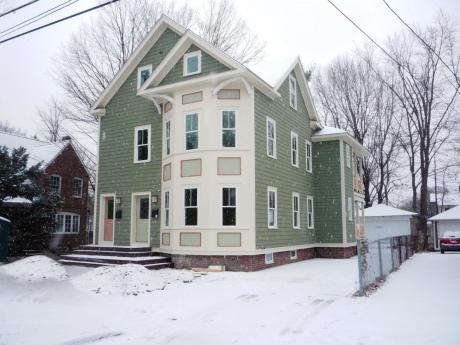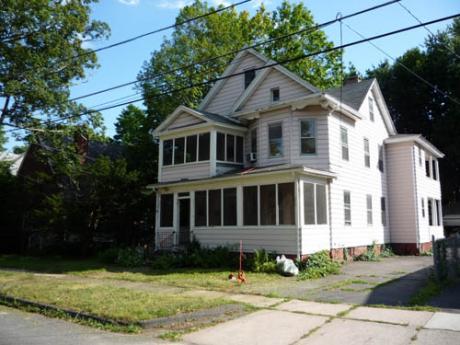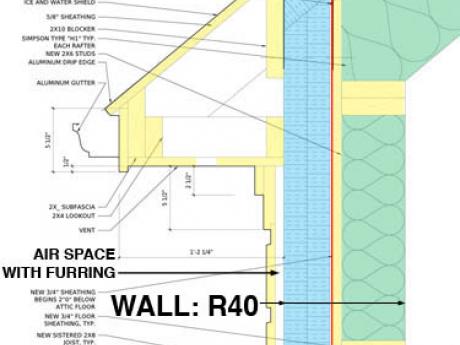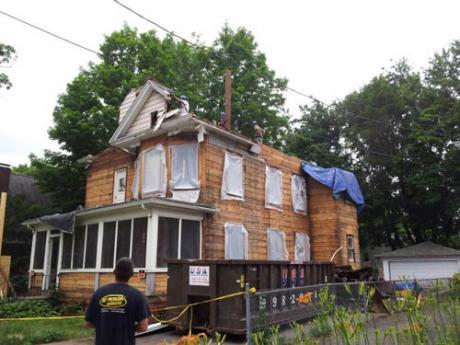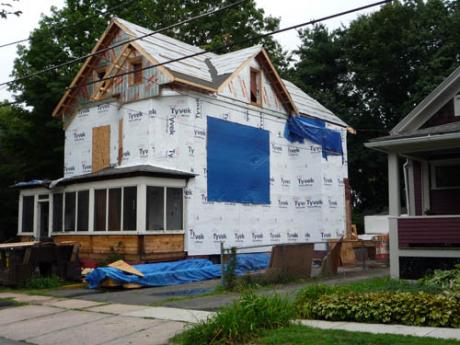Revell Retrofit
The owners, Peter and Rachel Stevens, are also the architects. As they started renovations, it became clear that most of the systems and finishes needed replacing, which made this two-family a perfect candidate for a Deep Energy Retrofit. All the exterior finishes had lived out their lifespan (and the aluminum siding recycles well), so exterior insulation was easy to add. The largest challenge for this job was to preserve some of the interior finishes and detail while replacing the entire shell and all systems. The owners helped with the insulating and air sealing, and ran interim blower-door tests, and they continue to work on interior paint and other small projects. They now enjoy a home that comfortably shelters their new daughter, as well as a family with two small children in the first floor apartment.
This project was funded in part by a grant from National Grid as part of their Deep Energy Retrofit pilot program. The project achieved a bonus for exemplary performance.
This home is Zero Energy Ready. Due to healthy, mature trees on the southern side of the site, photovoltaics are being purchased offsite as part of a community solar program. This offsite array will completely offset all energy used by the Stevens family. Meanwhile, a green energy surcharge is being paid to National Grid. The first floor unit could also pursue these same steps (even as tenants) to achieve Zero Energy for that portion of the house.
Quick Facts
General
| Location | Northampton, Massachusetts |
|---|---|
| Building Type | two-family residence |
| Project Type | Zero Energy Ready / Near Zero Energy |
| Basis of Performance Claim | Verified |
| Bedrooms | 3 |
| Bathrooms | 3.0 |
| Conditioned Floor Area | 3,600 sq ft |
| Total Cost of Project | $388,500 |
Energy Summary
| Energy Data Type | Verified |
|---|---|
| Renewable Energy System Type(s) | Photovoltaics |
| Ratings | |
| Net electricity usage (purchased) | -2,107 kWh/year |
| Annual renewable energy generated | 10,535 kWh/year |
Envelope and Mechanicals
| Subslab assembly |
Given the existing slab, we insulated above the slab. Dimple mat to allow movement of any water, taped. 2" rigid foam (XPS) insulation, taped. Click-together laminate flooring. |
|---|---|
| Foundation wall assembly |
We used foil-faced polyiso on the walls to provide a vapor barrier as well as air sealing and insulation. Two layers offset provided backup. |
| Above grade wall assembly |
The house is balloon framed with actual 2"x4" lumber. Our favorite insulation, dense packed cellulose, was not enough to superinsulate. We used it in the existing framing, and then added 2, 2" foil-faced polyiso layers staggered on the exterior. Furring strips held the siding away for airflow. |
| Door Assembly |
Thermatru Smooth Star |
| Air Changes per hour, ACH50 | 0.65 ACH50 |

